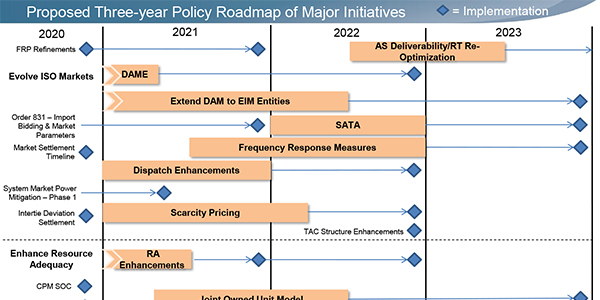CAISO said Wednesday it plans to begin a stakeholder initiative on scarcity pricing with an issue paper and formal start in January.
The planned measure is a response to the energy emergencies of August and September, which required CAISO to order rolling blackouts Aug. 14-15. The state avoided additional blackouts only through extraordinary conservation measures, including removing Navy ships from shore power.
Scarcity pricing had been part of the ISO’s efforts to enhance its day-ahead market and extend the Western Energy Imbalance Market from a real-time to a day-ahead market. But the shortages caused a reassessment, Brad Cooper, the ISO’s senior manager of market design policy, said during a web conference on the annual update to CAISO’s three-year policy initiatives roadmap.
“Prompted by the conditions that occurred this summer, we’re now planning a separate initiative that we’re going to prioritize for next year that’s going to explore enhancements to our scarcity pricing provisions,” Cooper said.
“Recently FERC approved our … Order 831 compliance filing, which in some cases raises the bid cap to $2,000, but it does that in relationship to fuel costs,” Cooper said. “Last summer, a lot of times, prices outside the ISO went above $1,000, and that was not driven by fuel costs but by scarcity conditions. Those events really drove home the need to improve our market pricing in those scarcity conditions.”
In September, CAISO’s Market Surveillance Committee recommended the ISO pursue a scarcity pricing initiative to deal with the types of severe shortfalls seen in mid-August and over Labor Day weekend. (See CAISO MSC Urges Scarcity Pricing for Emergencies.)
“The experiences of mid-August again signal the urgency of such an initiative,” the committee said in its unanimous opinion, which it forwarded to the CAISO Board of Governors. “These conditions will likely grow more frequent, and the region is in need of a more coordinated approach to managing scarcity conditions.”
Prices during the Western “heat storm” in August rose to $1,000/MWh or more and showed the need for higher-priced import offers during times of regional scarcity, the committee said. CAISO and market participants have noted that ICE prices for imported energy from neighboring states rose from $1,500 to $1,750 at the Palo Verde trading hub, which feeds into Southern California.
Scarcity pricing is triggered in markets when systems become so strained that reserve margins meant to protect the grid from collapse are threatened, as happened during the August blackouts.
A root cause analysis of the August blackouts by CAISO and other California agencies showed transmission constraints prevented ample, available imports from reaching the CAISO market and did not cite scarcity conditions. (See CAISO Says Constrained Tx Contributed to Blackouts.)
Cooper said he hopes to see an issue paper released soon after Jan. 1.
“We haven’t worked out the detailed schedule yet, but that’s our goal,” he said.
Other major initiatives in the roadmap include resource adequacy enhancements, day-ahead market enhancements and an effort to the extend the Western Energy Imbalance Market from a real-time to a day-ahead market.
All three could help CAISO meet its reliability issues as it switches from a market largely dependent on natural gas generation to one that plans to meet its capacity requirements through renewable energy and storage, ISO staff members said during the web conference.
A high priority is addressing the state’s summer evening net demand peak, after solar power goes offline but demand remains high during heat waves. The energy emergencies of August and September occurred under such conditions.
“A robust RA program is critical to ensuring reliable resources are procured with the right operational attributes and are available to the CAISO in order to serve load in all hours,” said Lauren Carr, an infrastructure and regulatory policy specialist with the ISO who presented the RA initiative.
The 2021 roadmap of policy initiatives is expected to go before the Western EIM Governing Body and the CAISO Board of Governors in December.




